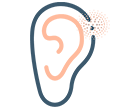Usher Syndrome Precision Panel
Usher Syndrome (USH) is a clinically and genetically heterogeneous disorder presenting with sensorineural hearing loss due to an impaired ability of the inner ear and auditory nerves to transmit sensory input to the brain.




